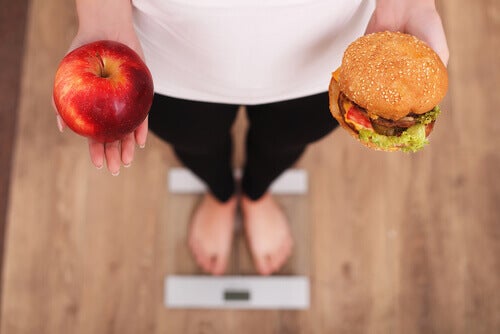Weight loss is a concern of many people, our society has been responsible for deifying physical appearance and turning it into a personal value when in fact it is not, since we cannot prove that no one is superior or inferior to anyone simply by having a plus or less ??
This constant concern to adapt to established standards and thus make our environment accept it, is partly responsible for several psychological disorders that revolve around an ideal appearance, such as anorexia and bulimia.
- However.
- There is a “but”.
- Although idealizing physique and silhouette and obsessing over weight is not the solution.
- Giving up the body and solving care of yourself isn’t the best option either.
Overweight almost always hides an emotional problem, and it is in these cases that eating is supposed to be the dressing that temporarily covers problems that we do not otherwise know how to manage, so it is necessary to integrate cognitive, emotional and behavioral techniques that help us control ourselves.
Forget about miraculous methods that are almost always restrictive, because you can only spend money and get discouraged when you realize you’re not getting results or that they’re damaging your health.
The only way to lose weight is to follow a personalized diet designed by a professional, complemented by a good exercise routine, but the simplest is also the most complicated. You want to know how to get it? The truth is that by following this path, psychology can help us.
Psychology is a discipline that can offer us several techniques aimed at achieving greater control of our impulses, being overweight is usually the result of an impulsive way of acting that leads us to attack the pantry, or the lack of an adequate organization that allows us exercise frequently.
Moreover, when we see that our weight has returned to normal, our morale is resentful, and we surrender even more to our own fate, to our impulses.
To break this circle, the first step is to prepare for action, that is, to be clear about what you want to change and to be prepared to use all your energies to achieve it. It won’t be easy or fast, but you’ll feel tremendously satisfied when you reach your goal.
We often eat and eat until the dish is finished simply because it’s full, but we may not even be hungry, it sounds obvious, but if you want to lose weight, you have to stay away from the huge dishes you keep in the kitchen. and buy smaller dishes, so you can only serve the right amount of food for the container.
You can rehearse later. However, having to go to the kitchen, start serving again and eating a second course will make you think a lot more before you do it.
If you go to the market and go shopping hungry, chances are you’ll end up buying high-calorie foods, such as cakes, chocolates, industrialized sweets, etc. It’s better to go shopping right after eating and being satisfied, so it’s our brain, not our stomach, that guides us. Similarly, if we can avoid having these kinds of unhealthy foods at home, it will be much easier not to fall into temptation.
While it’s not recommended to buy high-calorie foods, it’s also not a good idea to stick to a low-calorie diet that makes you hungry, if you’re not satisfied after meals, you’re most likely to fall into compulsion, and even more so that this compulsion leads you to eat high-calorie foods, so healthy eats healthy , but don’t be hungry.
Food is often a way to hide our negative emotions, they are a negative and positive reinforcement, which means that every time we feel bad, we go to the fridge or pantry, so the emotion goes down and we feel better.
The problem is that this improvement lasts only a moment, and then leads to guilt, so we must learn to tolerate emotions, to embrace them as part of ourselves and not to try to escape them by passing them to the stomach and digesting them with guilt.
The idea is not to be hungry and do too much to compensate, just as it is not recommended to follow a low-calorie diet, nor is it ideal to eat several times a day, since you can get used to pinching them all. It is better to have six well-established meals so that there are no holes in which you may be hungry and temptations appear.
Everything that is forbidden ends up becoming desirable, so we should not cut off the food completely, this does not mean that we have carte blanche to eat it whenever we want, but we can afford to eat it at least once a week. , we will kill the will and it will no longer be so desirable.
Many of the foods that we like the most to our liking and brain are the least healthy. A good strategy is to maintain a rational internal dialogue with ourselves about the foods we select for consumption.
For example, if you want to eat a meat sandwich, you can send your brain the message that it is an unhealthy food, made with leftover poor quality meat mixed with sugar, which will only provide you with a momentary pleasure. you want to eat it?
Alongside these strategies, there should never be an hour of daily physical exercise, good hydration, a quality social circle and the strength to face problems, looking for functional solutions, if we can integrate these techniques into our day to day, sooner than we want. Imagine, what seems very difficult today will eventually become a habit, and you can lose weight in a healthy way and keep it away.

